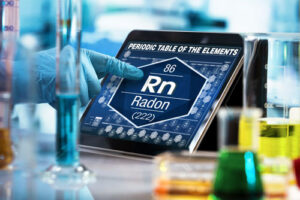

What is Radon?
Radon is a radioactive element. Unlike most other radioactive elements, however, radon typically exists as a gas. As a result, radon tends to rise up as other elements in the earth break down through natural radioactive decay, and this lets it enter homes through a basement or foundation. Because of this, radon can easily collect in significant volumes in homes, where it readily attaches itself to dust and other particles that can be inhaled. However, radon typically breaks down into other elements fairly quickly, so the real risk is when it regularly enters your home in significant volumes.
Where Does Radon Occur?
Radon occurs across the globe, although some areas see significantly higher rates of radon than others, particularly at higher latitudes. That said, it’s difficult to predict how vulnerable a particular area is to radon, and all homeowners should ensure they take the threat seriously, as even a relatively small amount of radon can cause significant health issues. Even if your home is in a low-risk area, your property might fall on a hot spot.
Why is Radon Dangerous?
Although radon is potentially dangerous in labs and industrial scenarios, its biggest threat in the home is the risk of cancer. Because radon is a gas, it can be absorbed into the lungs, where its relatively large size can cause it to become lodged for an extended period of time. The risk of developing cancer from radon exposure is significantly higher among smokers, but thousands of people die every year from radon exposure even without a history of smoking. In fact, radon is believed to be the second-leading cause of lung cancer in the United States.
Am I at Risk?
Fortunately, radon is relatively easy to detect using a simple radon detector. In recent years, a number of smart radon detectors have come to the market, and these devices are great for detecting both your short-term and long-term exposure risk. Armed with this information, you can determine if you need to take extra steps to reduce your exposure. It’s worth noting that small changes deep below the earth can change your radon exposure greatly over time, so it’s worth monitoring your radon levels on a regular basis.
How is Radon Mitigated?
There are a number of strategies for reducing radon in a structure. In many cases, radon gasses are moved outside of your home before it has a chance to enter it through collection systems below your home’s concrete foundation. In some cases, installing a membrane can be even more effective in preventing incursions. For some structures, simple changes to your HVAC system can be more than enough to cut back on your risk significantly. Because of how complex radon mitigation is, it’s worth consulting with a certified expert if you have questions.
What Should I Do?
No matter where you live or how common high levels of radon are in your area, it’s worth investing in a simple radon detector to find out if your home is within safe limits. If you don’t want to invest much, short-term test kits can cost as little as $15, but smart devices that provide constant monitoring can cost only $80 or even less. If you find that your radon levels are higher than recommended, make sure to contact an expert; the cost to mitigate radon exposure might be less than you imagine.
Most homeowners wouldn’t feel safe without having a smoke detector in their homes. However, radon doesn’t present the same frightening visuals and threat of instant catastrophe as fires, so it’s often ignored by the public. Fortunately, modern technology has made radon far easier to manage than in the past, and a bit of vigilance can go a long way toward ensuring you and your family aren’t being exposed to unnecessarily high levels of radon.

